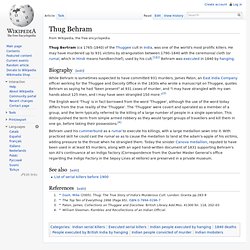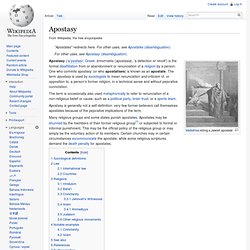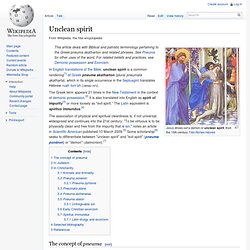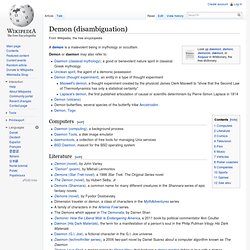

Thug Behram. Thug Bertram (ca 1765–1840) of the Thuggee cult in India, was one of the world's most prolific killers.

He may have murdered up to 931 victims by strangulation between 1790–1840 with the ceremonial cloth (or rumal, which in Hindi means handkerchief), used by his cult.[1][2] Behram was executed in 1840 by hanging. Biography[edit] While Behram is sometimes suspected to have committed 931 murders, James Paton, an East India Company officer working for the Thuggee and Dacoity Office in the 1830s who wrote a manuscript on Thuggee, quotes Behram as saying he had "been present" at 931 cases of murder, and "I may have strangled with my own hands about 125 men, and I may have seen strangled 150 more.
"[3] The English word 'Thug' is in fact borrowed from the word 'Thuggee', although the use of the word today differs from the true reality of the 'Thuggee'. Behram used his cummerbund as a rumal to execute his killings, with a large medallion sewn into it. See also[edit] References[edit] Apostates. Apostasy (/əˈpɒstəsi/; Greek: ἀποστασία (apostasia), 'a defection or revolt') is the formal disaffiliation from or abandonment or renunciation of a religion by a person.

One who commits apostasy (or who apostatises) is known as an apostate. The term apostasy is used by sociologists to mean renunciation and criticism of, or opposition to, a person's former religion, in a technical sense and without pejorative connotation. The term is occasionally also used metaphorically to refer to renunciation of a non-religious belief or cause, such as a political party, brain trust, or a sports team. Apostasy is generally not a self-definition: very few former believers call themselves apostates because of the pejorative implications of the term.
Many religious groups and some states punish apostates. Sociological definitions[edit] The American sociologist Lewis A. The American sociologist David G. Stuart A. Unclean spirit. This article deals with Biblical and patristic terminology pertaining to the Greek pneuma akatharton and related phrases.

See Pneuma for other uses of the word. For related beliefs and practices, see Demonic possession and Exorcism. In English translations of the Bible, unclean spirit is a common rendering[1] of Greek pneuma akatharton (plural pneumata akatharta), which in its single occurrence in the Septuagint translates Hebrew ruaḥ tum'ah (רוח טומאה). The Greek term appears 21 times in the New Testament in the context of demonic possession.[2] It is also translated into English as spirit of impurity[3] or more loosely as "evil spirit. " The Latin equivalent is spiritus immundus.[4] The concept of pneuma[edit] The practice of insufflation and exsufflation, or the use of released breath in ritual, depends on conceptualizing a spiritual entity as air in motion, "invisible yet active":[15] both Greek pneuma and Latin spiritus had an original meaning of "breath, mobile air.
" In Judaism[edit] Demon (disambiguation) A demon is a malevolent being in mythology or occultism.

Demon or daemon may also refer to: Songs Demon Internet, an Internet service provider now a subsidiary of Cable & Wireless Dale Torborg (born 1971), professional wrestler performing in WCW under the name The DemonMelbourne Football Club, an Australian Football League teamCardiff Demons, a Welsh rugby league team.